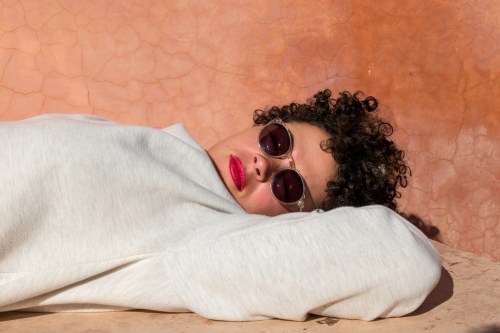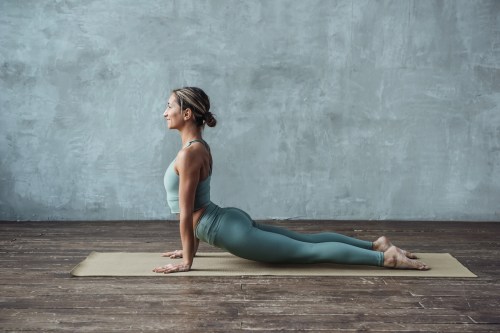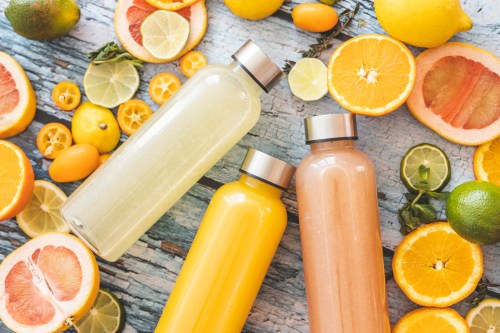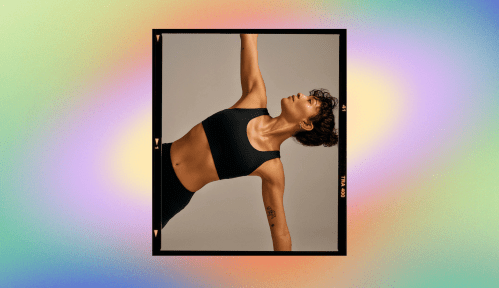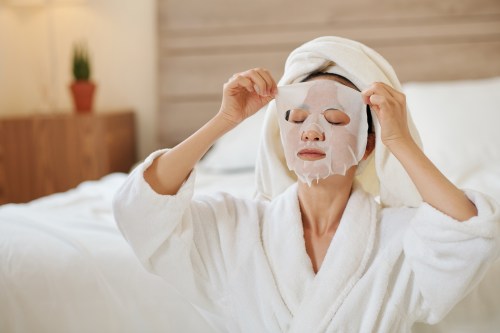This is what my face looks like.
It’s a phrase that had been spinning around in my head for the better part of the past year as I ponder the true job of beauty in our lives. It’s the opinion of this website, for example, that beauty is something that should inspire confidence via creative expression, that it should call you to try, test, play, and that whatever you swipe on should be in the spirit of feeling even more like yourself. But it shouldn’t make you feel bad. It shouldn’t be a chore. It shouldn’t feel as though you’re shedding natural-born signatures to become the ideal.
And yet with an expanding empire of Instagram aesthetics (no longer confined to makeup alone, the wonder now extends to fitness, skin care, infinity), beauty inspiration can feel frozen in a FaceTuned, filtered lens that caters more to mass appeal than individual quirks. As we know, other cultures have actively lauded the latter for their ability to evoke emotion, like the French insouciance that seems so elusive on this side of the Atlantic.
In Korea, the “escape the corset” movement has women risking their careers by rejecting restrictive beauty standards. In America, we laud foundation launches in dazzling 40-shade ranges and skin care with cleaner ingredients even while the demand for Lolita-esque youth and robotic perfection has become such a streaming constant that it sneaks beneath the radar like white noise—until you’re hit with that fog horn blast of personal clarity.
What happens when beauty becomes part of the job
For me that clarity happens often. To be a beauty editor, one must operate under the assumption that the best has yet to be tried, that life-changing newness really is around the corner, and that it will, indeed, be worth the quest once it’s uncapped. Still, there’s an inherent problem solving that beauty products present: Have a breakout? Here’s a stick-on spot treatment. Have fine lines? Try hyaluronic acid. But where should the line stop when you rely on pros for guidance?
Case in point: an instance when I was scouting “low-downtime treatments” (think sun damage-eliminating lasers so gentle you can walk straight to a cocktail party after an appointment) at a plastic surgeon’s office in New York City. Even after I explained that my piece would be about skin health, the doctor felt comfortable telling me that I needed about one half of a whole new face. In his mind, the recommended procedures would amount to perfection; in mine, it all added up to a loss of individuality. Even my dark circles are a feature of actual pride—I’d dare say a celebration of my ArdenParty life choices—and should they not disappear following a disco nap, then I’m happy to see them.
This Parisian Skincare Brand Is Launching in the United States for the First Time—Here’s What a Derm Wants You to Know

We’re Calling It: Cleansing Balms Are the Face Wash of the Future—Here Are 3 to Add to Your Cart

This Is the One Product That Scarlett Johansson Always Keeps in Her Purse and on Her Bedside Table

When I asked if this type of (heavy-handed) assessment could be considered routine for women in their 20s and 30s, he assured me that it was the go-to solution for top models and influencers alike. But, I’m not interested in looking like anyone else’s idea of what perfection has been or is now. My job, at its best, is to help forge what the future looks like, and if that holds darker circles and deeper smiles lines then cool, cool, cool, cool, cool. Finding personal beauty should be a thrill, and not a laundry list of sameness.
As I talk to a fellow writer and creative consultant Mia Adorante, we discuss how the pressure to partake is an easy one to succumb to—it’s only human. “Falling down the rabbit hole of self-improvement is easy. Many a bottle blonde started with just a few highlights. I’ve been there!” she enthuses of her naturally chestnut-colored lengths. As for her appearance becoming part of her job, she takes it in stride. “It can be a pretty liberating thing. We express so much about ourselves with how we present ourselves. We don’t have to, but if you dig into it in the right way, you can say a lot without saying anything at all.”
But when your job is to say things through the articles you write, how much of that conversation should happen on Instagram (with its filters and highlight reels)? After 14 years in the business, travel writer Amelia Mularz still experiences the out-of-body strangeness brought on by social media standards. “I sometimes try to picture Freya Stark and Bruce Chatwin—two legends in travel writing—living in an Instagram world,” Amelia says with a laugh. “The idea of Chatwin traipsing through the wilds of Patagonia with one of those glowing phone cases for ideal selfie lighting makes me chuckle.”
Writers who got into this profession to flex their brains are realizing that careers (especially when critiqued by likes and followers) often rest on appearances. Recently, in a moment of weakness, Mularz described taking an IG screen grab of another journalist showing off her immaculate complexion on a scouting trip, and asked a friend if she’d be better at the job if she started posting images like this one. “Every now and then I wonder if I’d be more successful if I looked a certain way, but then I’ll wake up in a bus station, my head resting on a Doritos bag for a pillow, and I think, welp, I just hope my words are compelling.”
Beauty pros feel the pressure to look a certain way, too
Swapping the keyboard for a kit, makeup artists face their own form of visual pressure to continue the cycle or “look the part.” Shannon Rodriguez, an NYC-based makeup artist who’s worked with powerhouse beauty players like Ulta, Sephora, Urban Decay, and MAC Cosmetics, sees it from cosmetic counters to commercial shoots. “I’ve had girls as young as 12 coming to the department store counter asking how to contour because they learned ‘that’s what they need to do’ from YouTube,” she tells me. “Instead of showing these girls how to look like everyone else, I teach them about skin care and age-appropriate makeup that enhances their features,” Rodriguez adds.
Yet on set, again, the focus is on her own appearance because she opts for a no-makeup look over an air-brushed finish. “There’s always a pressure from the industry to look youthful. I disagree with the idea that we’re asking to be judged because we work in the beauty industry—I don’t think we should be graded on our genetics, instead it should be about the artistic skills we can deliver,” she says.
UK-born editorial makeup artist Omayma Ramzy, whose work graces the pages of Italian Vogue as well as fashion labels like H&M and Jonathan Simkhai, saw a shift as soon as she crossed the pond. “I moved to Los Angeles a few years ago, and I realized that the way I looked was affecting the jobs I was getting. I think compared to London, there’s more pressure on image and appearance in Los Angeles. For a long time, I’d show up with a full face of makeup on, kind of to prove they hired the right girl, but it’s not really who I am,” she admits. Now, she lets her work speak for itself—but notices clients struggle all the same. “I think we have such a ‘done up’ look pushed on us from social media these days, this impossibly unattainable goal is the standard for all faces. So it’s with great joy that I show up to work a lot of the time flaunting my eye bags and skin pigmentation.”
When I bring up the question that inevitably will surface in the wake of this piece: Are we asking for it by being a part of this industry?, she doesn’t skip a beat. “Part of me thinks, well here I am, I signed up to be part of this industry, I should really pay homage, I should dress up, I should wear so much makeup, I should look the part. But then inside, deep down, I believe if I don’t act and present myself the way I really feel, the way I am, then…who will?”
BTW: Here are the 3 personality traits that “everyday saints” share and this is what motivates you depending on your Myers Briggs type.
Sign Up for Our Daily Newsletter
Get all the latest in wellness, trends, food, fitness, beauty, and more delivered right to your inbox.
Got it, you've been added to our email list.
